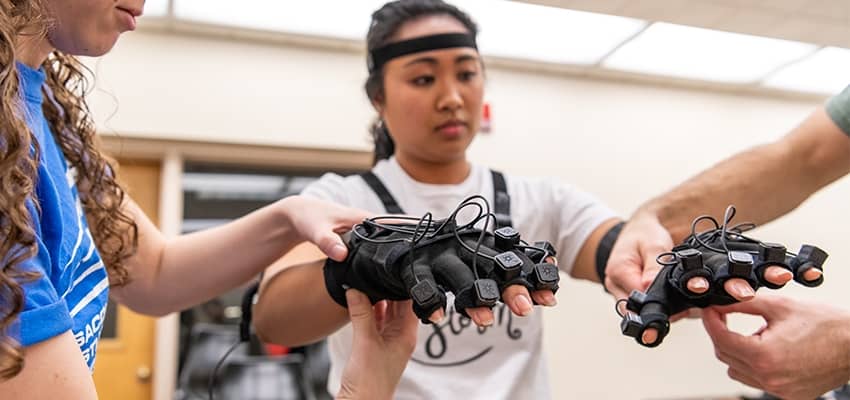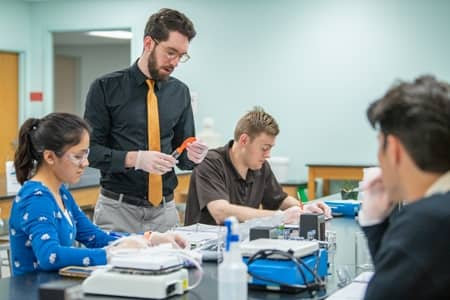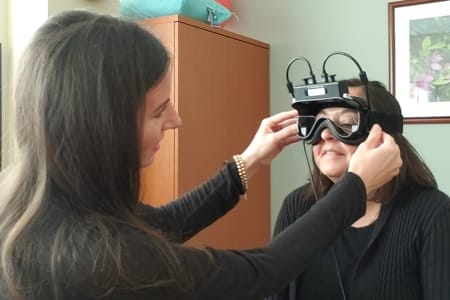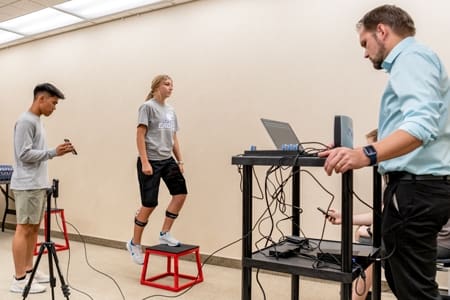
Physical therapy is a rewarding occupation with a uniquely personal approach to health and wellness. Often, therapists meet patients shortly after an accident or a life-changing diagnosis. The relationship closely follows the patient’s journey from the original tragedy toward pain alleviation, prevention, and healing, resulting in increased mobility and normal function. When students study pre-physical therapy at Pensacola Christian College, they’re equipped to help patients meet their goals while demonstrating God’s love.
“My favorite part about being a physical therapist is the ability to improve someone’s quality of life and get them back to enjoying their pain-free life,” shared Dr. Ian Berry (Pre-Physical Therapy ’17), a physical therapist at Renew: Concierge Physical Therapy. “I had plenty of physical therapy when I was younger and it drove me to want to be able to help others just as I was helped.”
Technical Training
Chair of the Natural Sciences Department Dr. Shane Smith explained that “the main goal of the pre-physical therapy program is to prepare students to enter a doctor of physical therapy program after graduation. We compare our program to the entrance requirements for graduate physical therapy schools to ensure our students meet those requirements.”

A doctorate in physical therapy involves three years of graduate school: two years in the classroom and one year of practical training in clinical settings. These years may be organized differently depending on the programs, but they all include the same basic structure. The program concludes with a licensing exam allowing students to practice physical therapy.
“Students in the pre-physical therapy major take their natural sciences courses in the same classrooms with pre-medicine and pre-pharmacy students,” Dr. Smith continued. “They are all challenged to master the material and earn excellent grades to be competitive in applying to their chosen health graduate programs. Our courses are also taught from the biblical worldview that God is the Master Designer and Creator of all things and that God made man special when He formed Adam from the dust of the ground and Eve from the rib of Adam—and both in His image and His likeness.”
“Our courses are also taught from the biblical worldview that God is the Master Designer and Creator of all things.”
In the science labs, students apply what they learn with biosensor equipment. Gaining practical experience, students use equipment like IMUs (inertial measurement units) to analyze range of motion, EMGs (electromyograph) to diagnose neuromuscular disorders, pressure insoles to correlate pressure data from the subject’s weight shifting while standing and moving, and more.
Strengthening the Core
Before earning his doctorate, Dr. Berry built a foundation in physical therapy at Pensacola Christian College. “I chose to study at PCC because it is a school with a high academic standard and Christ-centered vision and mission,” he said. “PCC’s program prepared me well for my work—mainly by preparing me for graduate school. The prerequisites I took were a strong foundation for my graduate studies courses.”
“The prerequisites I took were a strong foundation for my graduate studies courses.”

Because of the rigor of their undergraduate studies, Drs. Josiah and Kendra McFarland (Pre-Physical Therapy ’16) felt prepared to pursue their doctorates. “The undergraduate program prepared us mentally and spiritually for our three-year doctoral program,” they agreed. They now both work at Southeast Medical Center in Dothan, Alabama. “Whether [our patient] was born with neurological disease or the adult suffered a stroke/spinal cord injury, [our] job is to help the individual improve in functional mobility and return to a prior level of function,” Kendra added.
Dr. Jessica Schilt (Pre-Physical Therapy ’08), a vestibular specialist at Aurora Health Care Systems, seeks to show God’s love in each patient interaction. From her experience as a student, PCC “was Christ-focused and pointed me in the direction of using my hands to help those in need who are hurting. I have seen those who need a word of encouragement, a kind word, or even just an ear to listen to them in addition to assisting their physical ailment.”
Treating the Whole Patient
“I believe that PCC taught me to view everything through a Christian worldview,” shared Dr. Berry. “This is even more important as a physical therapist. It makes you realize that you aren’t only treating people or bodies but also a person with a soul.”
The McFarlands in Alabama have witnessed their practice influence their patients’ lives, ranging from infant to geriatric. Kendra expressed, “We have the privilege to see a person suffering from pain and possibly facing depression grow stronger and accomplish tasks that he/she may have never thought possible to accomplish again.”

“We are called as Christians to love and provide eternal hope to our patients.”
The physical therapist and patient interaction is personal by nature. This gives doctors with a solid biblical perspective of the human body a greater opportunity to reach their patients’ souls while healing their bodies.
“We are called as Christians to love and provide eternal hope to our patients,” said Dr. Kendra McFarland. “We have experienced countless interactions in which we know God placed us to be an encouragement and eternal influence on an individual. That is the ultimate reward of our practice as Christian physical therapists.”
